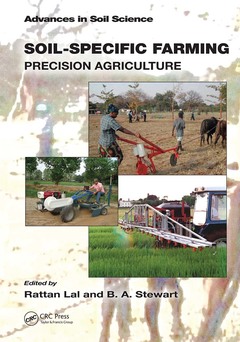Soil-Specific Farming Precision Agriculture Advances in Soil Science Series
Coordonnateurs : Lal Rattan, Stewart B.A.

Faced with challenges of resource scarcity and environmental degradation, it is important to adopt innovative farming systems that maximize resource efficiency while protecting the environment. Soil-Specific Farming: Precision Agriculture focuses on principles and applications of soil-specific farming, providing information on rapidly evolving agricultural technologies. It addresses assessments of soil variability and application of modern innovations to enhance use efficiency of fertilizers, irrigation, tillage, and pesticides through targeted management of soils and crops.
This book provides the technological basis of adopting and promoting precision agriculture (PA) for addressing the issues of resource scarcity, environmental pollution, and climate change. It focuses specifically on PA technologies and discusses historical evolution, soil variability at different scales, soil fertility and nutrient management, water quality, land leveling techniques, and special ecosystems involving small landholders and coastal regions.
Highlighting the scale-related issues and concerns of small landholders, the text details the efficient use of resources on the basis of soil/field variability and site-specific conditions. It examines how PA technology can increase productivity, enhance profitability, and minimize environmental degradation. Woven throughout is the theme of sustainable use of resources.
Precision Agriculture, the Next Revolution. Historical Evolution of Precision Farming. Estimating Spatially Variable Soil Properties for Application in Precision Farming. Soil Sampling Strategies for Precision Agriculture. A Decision Support System for Fertilizer Management. Kriging and Soil Sampling for Precision Agriculture. Nutrient Management by Site-Specific Zones in Precision Agriculture. Variable Rate Aerial Application of Input in Precision Agriculture. Application of GPS and Sensors with Information Technology for Crop Protection. Precision Irrigation. Conservation –Oriented Precision Agriculture. Root-Water Uptake Model for Sustainable Irrigation. Irrigation Management by SWAT. Spatial and Temporal Variability in Soil Hydrologic Properties. Indicators of Crop Nitrogen Status. Optical Remote Sensing of Soil Chemical Quality. Top Dressing of Nitrogen Fertilizer by Optical Sensors. Soil Fertility Assessment by Infrared Spectroscopy. Mapping Soil Properties by Measuring Electrical Conductivity. Fuzzy Clustering Techniques for Establishing Management Zones. Indicator Kriging for Soil Fertility Evaluation. Field Scale Measurement for Soil Fertility Parameters. Precision Farming in China. Research and Development Priorities.
Rattan Lal, PhD, is a distinguished university professor of soil science and director of the Carbon Management and Sequestration Center, The Ohio State University, and an adjunct professor of the University of Iceland. His current research focus is on climate-resilient agriculture, soil carbon sequestration, sustainable intensification, enhancing use efficiency of agroecosystems, and sustainable management of soil resources of the tropics. He received honorary degrees of Doctor of Science from Punjab Agricultural University (2001); the Norwegian University of Life Sciences, Aas (2005); Alecu Russo Balti State University, Moldova (2010); and the Technical University of Dresden (2015).
He was president of the World Association of the Soil and Water Conservation (1987–1990); the International Soil Tillage Research Organization (1988–1991); the Soil Science Society of America (2005–2007); and is president-elect of the International Union of Soil Science. He was a member of the Federal Advisory Committee on U.S. National Assessment of Climate Change-NCADAC (2010–2013) and is a member of the SERDP Scientific Advisory Board of the US-DOE (2011–present); senior science advisor to the Global Soil Forum of the Institute for Advanced Sustainability Studies, Potsdam, Germany (2010–present); member of the Advisory Board of the Joint Program Initiative of Agriculture, Food Security and Climate Change (FACCE-JPI) of the European Union (2013–present); and chair of the Advisory Board of the Institute for Integrated Management of Material Fluxes and Resources of the United Nations University (UNU-FLORES), Dresden, Germany (2014–2017). Professor Lal was a lead author of IPCC (1998–2000). He has mentored 102 graduate students and 54 postdoctoral researchers, and hosted 140 visiting scholars.
He has authored/coauthored 730 refereed journal articles and has written 12 and edited/coedited 58 books. In 2014, Reuter Thomson listed him among the world’s most influe
Date de parution : 06-2021
17.8x25.4 cm
Date de parution : 07-2015
Ouvrage de 417 p.
17.8x25.4 cm
Thèmes de Soil-Specific Farming :
Mots-clés :
Precision Agriculture; Fertility Soils; Advances in Precision Farming; Soil Quality; Precision Spacing; Precision Farming; Soil Fertility Management; Precision Conservation; Coastal Ecoregions; Precision Agriculture Technologies; Nuclear and Isotopic Techniques; Spatial Variability; Variable Rate Fertilizer Application; Precision Land Leveling; Variable Rate Applications; Remote Sensing; Soil Survey; Variable Rate Irrigation; Precision Irrigation; Soil Organic Matter; Sustainable Intensification; Soil Management; Moisture Content; Management Zones; GY; TOC Content; Hydrologic Model; Variable Rate Fertilizer; IAEA 2014b; Site Specific Management
